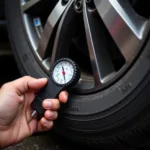Taking your car in for a service can sometimes feel like handing over the keys to a mysterious black box. You know it’s important to keep your car running smoothly, but what exactly are those mechanics doing under the hood? Understanding the ins and outs of a car service can help you feel more confident about the process and make informed decisions about your vehicle’s maintenance.
This comprehensive guide will walk you through the essential checks and procedures typically performed during a car service.
The Essentials: What to Expect at Every Service
While the specifics can vary based on your car’s make, model, age, and mileage, certain fundamental checks are standard practice:
- Oil and Filter Change: This is the cornerstone of car maintenance. The engine oil lubricates moving parts, reduces friction, and prevents overheating. Over time, the oil degrades and becomes less effective.
- Fluid Level Checks: Your car relies on various fluids to function correctly – coolant, brake fluid, power steering fluid, transmission fluid, and windshield washer fluid. Mechanics top off these fluids to ensure they’re at the optimal level for your car’s performance.
- Filter Inspections and Replacements: Aside from the oil filter, your car has other filters that keep vital systems running smoothly, such as the air filter and cabin air filter. Mechanics inspect these filters and replace them if they’re clogged or dirty.
- Tire Pressure and Condition Check: Proper tire pressure is crucial for safety and fuel efficiency. Mechanics will inflate your tires to the recommended pressure and inspect them for wear and tear, ensuring they provide optimal grip and handling.
- Brake Inspection: Your brakes are paramount for your safety. Mechanics visually inspect your brake pads and discs for wear, checking for any signs of damage or uneven wear that could compromise braking performance.
- Battery Test: The battery is your car’s lifeline. A quick test will tell the mechanic its voltage and overall health, potentially alerting you to a failing battery before it leaves you stranded.
- Lights Check: All exterior lights are checked for proper function, ensuring visibility and safety on the road.
Going Deeper: More Comprehensive Service Checks
Beyond the basics, more comprehensive car services may include the following:
- Spark Plug Replacement: Spark plugs ignite the air-fuel mixture in the engine. Over time, they wear down, leading to reduced engine performance.
- Air Filter Replacement: The air filter prevents dust and debris from entering the engine. A clogged air filter can restrict airflow, reducing engine power and fuel efficiency.
- Cabin Air Filter Replacement: This often-overlooked filter cleans the air that enters your car’s cabin. Replacing it ensures you breathe clean air and can improve the efficiency of your car’s heating and cooling system.
- Coolant Flush: The coolant prevents your engine from overheating. A coolant flush removes old coolant and replaces it with fresh coolant, ensuring optimal engine temperature and preventing corrosion.
- Transmission Fluid Change: The transmission fluid lubricates and cools the transmission. Over time, it can break down and lose its effectiveness. A transmission fluid change can help prevent costly transmission repairs.
Understanding Service Intervals: When to Book Your Next Appointment
Car manufacturers provide recommended service intervals in your owner’s manual. Generally, you’ll encounter two main types of services:
- Interim Service: Typically recommended every 6,000 miles or 6 months, this service focuses on essential checks and maintenance, including an oil and filter change, fluid top-ups, and visual inspections. how often to have car serviced
- Full Service: Recommended annually or every 12,000 miles, a full service is a more comprehensive checkup that includes all the elements of an interim service plus additional checks and replacements based on your car’s age, mileage, and manufacturer recommendations.
Expert Insight: “Sticking to your car’s recommended service schedule is the single most effective way to prevent breakdowns, extend the life of your vehicle, and maximize its resale value,” says John Smith, Senior Automotive Technician at XYZ Auto. “Don’t wait for a warning light to pop up – preventative maintenance is key.”
Beyond the Checklist: What Else Do Mechanics Do?
A good mechanic does more than just tick boxes on a checklist. They also:
- Conduct a Thorough Road Test: This allows the mechanic to experience how your car handles and listen for any unusual noises or vibrations that might indicate a problem.
- Use Diagnostic Equipment: Modern cars are equipped with onboard computers. Mechanics use diagnostic tools to connect to these computers, read error codes, and identify potential issues that might not be obvious during a visual inspection.
- Provide a Written Report: After the service, a reputable mechanic will provide you with a detailed report outlining the work completed, any parts replaced, and any recommendations for future maintenance or repairs.
Empowering Your Automotive Journey
By understanding what happens when you take your car in for service, you can ask informed questions, make educated decisions about your vehicle’s maintenance, and ensure it continues to deliver a safe and reliable driving experience for miles to come. Don’t underestimate the power of proactive car care.

